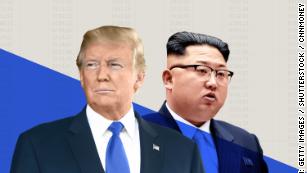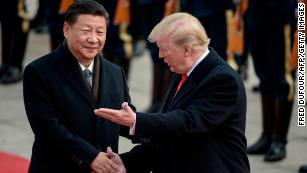Key US allies ‘perplexed’ as Trump treats friends like enemies
Washington (CNN) President Donald Trump’s decision to cancel his historic meeting with North Korea’s Kim Jong Un left South Korea’s President “perplexed” and sparked angry protests in Seoul. One sign read: “We condemn Trump.”
Welcome to life these days as a close US ally.
Under the 45th President, long-standing US friends and partners have come in for surprises, some of them bruising. Trump has questioned enduring alliances, insulted neighbors, threatened tariffs against some of America’s oldest friends and made clear he’ll sanction their businesses if they don’t toe his line.
Trump’s allies say this is the President’s “peace through strength” doctrine at work, where America flexes its military and economic muscles to shape the world it wants. It’s a theme Trump warmed to Friday in Annapolis, telling US Naval Academy graduates that the world is “respecting us again,” a theme he stressed in his first State of the Union address, declaring that “weakness is the surest path to conflict, and unmatched power is the surest means of our defense.”
But there are other forces at work that are shifting the ground on US relationships around the world, including the President’s personality, his campaign promises and the overwhelming weight he places on domestic politics.
‘We’re dragging you along’
“Trump’s relationships with allies are preternaturally different than any other administration we’ve had,” said Aaron David Miller, a senior vice president at the Wilson Center.
The threats to sanction allies aren’t so much a case of “if you’re not with us, you’re against us,” said Suzanne Maloney, deputy director of the foreign policy program at the Brookings Institution. “This is the administration saying, ‘You’re with us, even if you don’t want to be with us. We’re dragging you along.’ “
Critics have said Trump’s mercurial decision-making on international issues and his treatment of allies are undermining US interests and trust in Washington.
Rep. Eliot Engel of New York, the ranking Democrat on the House Foreign Affairs Committee, pointed to Trump’s decision Thursday to pull out of the North Korea summit and said the President has “alienated our friends, doubted the value of our alliances and undermined American credibility around the world.”
He and others point to a January Gallup poll that found the image of US leadership is weaker and global approval of the US has sunk to a record low of 30%.
That is 18 percentage points lower than the last year of President Barack Obama’s tenure and 4 points beneath the previous record low, during President George W. Bush’s administration.
The Gallup pollsters said that “based on the trajectory of what the world thinks of the US, many of the US alliances and partnerships that the Trump administration considers a ‘great strength’ are potentially at risk.”
Some missteps are hard to understand.
South Korean President Moon Jae-In was blindsided by Trump, learning about his summit decision only after the news broke. The White House hadn’t given Seoul or Tokyo any warning and Moon had to gather his national security team at midnight to determine a response. His office released a statement chastising the US for its failure to communicate.
“When you have the South Korean President say he was embarrassed and perplexed by the announcement, and they had an emergency meeting to respond, it’s not a good thing,” said Bruce Klingner, a senior fellow at the Heritage Foundation.
But Miller points to other, more deliberate reasons why US alliances may be on shakier ground, one being the President’s campaign promise of “America First,” a move to pull back from global engagement and concentrate on US development.
Under that agenda, a more transactional approach becomes the norm and “allies become much less important unless they fundamentally address a goal that’s important to Donald Trump,” Miller said.
That means Trump can flatter Chinese President Xi Jinping because he needs his support on North Korea, and chastise Mexico for illegal immigration, but he doesn’t have to cultivate the Europeans because the issues he would need them on, including the Iran nuclear deal and climate change, “he doesn’t care about,” Miller said.
Indeed, the US-Europe relationship is as strained as it’s been in a long time, with the possibility of a trade war on the horizon. In the wake of Trump’s decision to leave the Iran deal, the White House has made clear it will sanction European companies that continue to do business with Iran. By June 1, the administration will also decide whether to slap the European Union with aluminum and steel tariffs.

